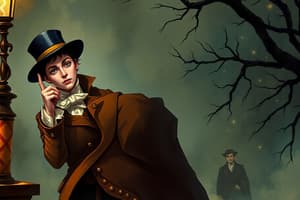Podcast
Questions and Answers
Which of Dickens' works is referenced as drawing from his personal experience working in a factory?
Which of Dickens' works is referenced as drawing from his personal experience working in a factory?
- Oliver Twist (correct)
- David Copperfield (correct)
- Great Expectations
- A Tale of Two Cities
What was Charles Dickens's father's profession?
What was Charles Dickens's father's profession?
- Lawyer
- Journalist
- Factory Worker
- Clerk (correct)
What did Charles Dickens do for work after his father went to prison?
What did Charles Dickens do for work after his father went to prison?
- He attended school
- He wrote short stories
- He worked in a factory (correct)
- He became a journalist
How did Dickens's experiences influence his writing?
How did Dickens's experiences influence his writing?
What was Dickens's primary job before he became a successful writer?
What was Dickens's primary job before he became a successful writer?
Where did Dickens travel extensively after gaining success as a writer?
Where did Dickens travel extensively after gaining success as a writer?
What was Dickens's writing style like?
What was Dickens's writing style like?
Why was Charles Dickens considered one of the great novelists in the English language?
Why was Charles Dickens considered one of the great novelists in the English language?
Flashcards are hidden until you start studying
Study Notes
Overview of Charles Dickens
- Renowned English novelist, active during the 19th century (1812 - 1870).
- Wrote primarily about the harsh realities of Victorian England, focusing on the lives of the poor.
Early Life and Challenges
- Born into a large family in London; his father was a clerk but often in debt.
- Experienced poverty firsthand when his father was imprisoned for debts, leading to Charles working in a factory at age eleven.
- Worked ten-hour shifts for low pay (six shillings per week), walking four miles to his room each night.
- These early hardships influenced his writing, prominently featured in works like "David Copperfield" and "Oliver Twist."
Career Beginnings
- Started as a journalist at age sixteen for the Morning Chronicle, covering law courts and Parliament.
- Gained recognition for his vibrant and exaggerated character portrayals; good characters were exceptionally virtuous, while villains were despicable.
- Authored short stories that humorously depicted people from his observations, further enhancing his reputation.
Success and Recognition
- Achieved widespread popularity in various countries, including the United States, Italy, and Switzerland.
- His ability to blend social commentary with engaging storytelling captivated readers and secured his legacy as one of the greats.
Personal Life
- Fathered ten children but faced difficulties in his family life; marriage ended unhappily when his wife left him.
- Despite personal turmoil, he maintained a prolific writing and travel schedule.
- Died suddenly in 1870, leaving behind a rich literary legacy.
Studying That Suits You
Use AI to generate personalized quizzes and flashcards to suit your learning preferences.




